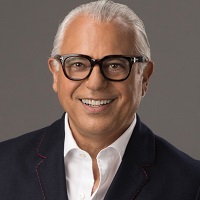
MyEDC gets you the answers you need
Join more than 30,000 Canadians who rely on MyEDC to grow their businesses with confidence.
Feb. 21, 2024

Dave Hale, CEO of Craft&Crew, joins host Joe Mimran for a trip down memory lane. From starting out as a social media company to rebranding and now, managing and creating B2B websites and marketing campaigns, Hale explains how his service-based company turned challenges into opportunities, and leveraged those opportunities for growth at home and abroad.
Where to listen
Follow us on your favourite streaming platforms to never miss an episode of the Export Impact Podcast. Tune into our podcast for new episodes every second Wednesday at 6 a.m. ET.
Joe Mimran (00:02): Hi, I'm Joe Mimran and welcome back to the Export Impact Podcast. If you run a business, you know that your website is more than a collection of pixels and code; it's the face of your business and an expression of your vision, purpose, and identity as an entrepreneur. In many cases, it's your most active interface with your customer. But how do you make a website that captures the essence of your business and presents it at a world-class level? That's where the professionals come in. One of them is Dave Hale, CEO of Craft & Crew, a Canadian design firm that calls themselves, ”the best website producers on earth.” And while you might think that's a lofty claim, they have the portfolio to back it up. Dave's here to tell us all about the principles of good design, how he expanded his business internationally, and what success means to him.
I'd like to begin today's episode by acknowledging that we're recording from my office in Toronto, which is on the traditional unceded territory of many nations, including the Mississaugas of the Credit, the Anishnabeg, the Chippewa, the Haudenosaunee, and the Wendat peoples, and is now home to many diverse First Nations, Inuit and Metis people. We value taking this moment to deepen the appreciation of our Indigenous communities wherever we are, and to remind ourselves of our shared debt to Canada's First Peoples. Welcome, Dave.
Dave Hale (01:36): Well, thank you, sir. What an honour to be interviewed by you today.
Joe Mimran (01:39): Well the honour is mine, as well. Reading about your business and your background, it's quite impressive, and certainly that you look like you're on the acquisition trail at the same time. So, you've built an amazing business. Before we get started, is it Dave or David?
Dave Hale (01:55): I mean technically, you know, my mother would say, “David,” as would my wife. I go by Dave. The story is if you're interested in hearing in the seventh grade, I read something that said that the most memorable names have the fewest syllables and end in vowels. And my 12-year-old brain was like, oh my God, you’re one move away from having the most memorable name per whatever random factoid at the time. And Dave Hale was born. I came home that day, told my parents, henceforth, Dave Hale's the most memorable name you can have. My mother had none of that, so, it was always David.
Joe Mimran (02:35): That's a good one and it's obviously kept you in a good stead. Why don't we start by just giving us a little bit of background on Craft & Crew and what you do and how you've expanded the business?
Dave Hale (02:48): Sure thing. I think it's important to understand there's Craft & Crew 2.0, there's 1.0 that preceded—we were actually called Social at the time. And then there's almost Craft & Crew 3.0, which I'd say is where we've been going the last year and look to continue to do so: 1.0 Social Group Inc. was founded as a social media management firm in 2010. If you remember those times, like there was actually no Facebook business pages. People were tweeting things still not X-ing things. And you know, there was a business to be built around just doing the community management or social media campaigns and that kind of stuff. Funny enough, it was never my objective. I never wanted to just be that marketer. It was just kind of the corner of the room that people—CMOs (chief marketing officers) and marketing VPs—were willing to put me in.
I've never had a problem getting into boardrooms, but you know, we'd get into those boardrooms and then you'd be kind of put in the corner of like, well, there's this social media stuff we know nothing about. If you want to help us with that, sounds good. But in terms of our advertising or marketing strategy, our branding works. It was like, no, we'll leave that to the professionals, kid. So, as time went on, we did evolve out of that and really by 2020, late 2019, the vast majority of our business was really doing two things: We were doing large-scale website design and development for largely business-to-business (B2B) brands, some of the most notable ones on earth and SurveyMonkey. And we've done some work for Honda and do a lot of work for realtor.ca and companies like that. We also had this burgeoning kind of media division as part of our business, as well where we do media strategy, media planning, campaign management, and buying.
From there, in 2020, we realized this kind of social name and positioning wasn't serving us very well anymore and rebranded the company to Craft & Crew, which was really a nod to, we do two things we think that make us successful. You have to be really good at what you do, the craft, and you need to have the best people who do it, the crew. That's where the name came from in that 2020 rebrand. And what's been funny is that since then, as you said, we've further evolved the business where today, what I would say, Craft & Crew Corp is really trying to do is become one of the largest marketing agency networks on earth —further continuing to reinvent ourselves and evolve the business model away from not only just providing really great services by really great people, but also having a nod to international growth expansion, mergers and acquisitions and everything that kind of goes along with that to grow our business in hopefully a pretty dramatic way moving forward.
Joe Mimran (05:42): I mean that's quite a bit that you're doing and that you've evolved into. I wonder if you could talk a little bit about ad agencies in bygone days and where you think ad agencies fit into all of this today. It sounds like, you know, marketing is such a big word, right? You seem to be sort of touching into so many different areas now and I'm curious to understand because I think marketing has become so complex and fragmented that it's very difficult to get attention these days. If you could talk a little bit about that, I think that'd be most interesting.
Dave Hale (06:24): I agree with the premise that you just gave, in terms of marketing being so complex, dynamic, multifaceted, etcetera, etcetera. We've actually largely built our business model around the avoidance of that complexity. One thing I didn't say in that overview is that while we refer to ourselves as a marketing agency, we‘re firmly entrenched as a marketing production company. So, if you look at the things that we do, the companies that we own, we have a video production company called Simple Story Videos. We have a website production company, which is our flagship name, Craft & Crew. Our media agency, Media Propulsion Laboratory, is really what we're doing: A lot of media planning, but being the big business there, which is like the production end of media strategy. And then we have another web agency called Phoenix that does a lot of website maintenance and support, which again is even the next level of production layered down from website design and development.
Alot of our clients are actually marketing or advertising agencies themselves focused on managing the big, complex, multifaceted world of marketing. Ironically, we're over here saying, “Hey, we have a few lanes that we stay in as a production-level partner to you; that's what we're really good at doing, that's what we want to do.” We've actually moved away from inserting ourselves in a lot of those client conversations with a CMO or a VP of marketing or the CEO of the company, in terms of where's the brand going, what are the channels we're using, what are the promotion strategies? Funny enough, that’s too complex now for my simple brain, so we’ll just sit back and do the things that we do. We've carved out areas that we’re really good at and that's what we want to be known for. The idea of the network we're building is actually meant to be the network partner that takes little slivers of that complexity and knows how to do that sliver really well across a few different fields.
Joe Mimran (08:24): That's interesting. Having said that, I mean you do make some claims like we can get you 20x ROAs (return on ads), right? Which to me sounds pretty marketing-laden. Now having said that, I also noticed that you’re servicing more B2B (business to business) than B2C (business to customer). And so maybe that changes the thinking on it.
Dave Hale (08:49): Some of these claims, like our 20 times return on ad spending, are real numbers from real clients. At the end of the day, I think what we've developed—you spoke about a little bit of a focus of ours in the B2B space—we actually have clients across the spectrum through acquisitions of other agencies we've experienced in the last year. But our bread and butter really isn’t the B2B space. What's interesting about enterprise-level organizations is that we do the opposite of what I would like to call, “ring a bell, get a cookie” advertising on our media propulsion lab part of our business. Ring a bell, get a cookie would be like someone has a Shopify store, they're selling sunglasses. The sunglasses cost $58 and we just need to put an Instagram ad in front of that person being like, “Look at these cool sunglasses. We spent $1.28 for someone to click on that, they go over to the Shopify store, they buy the sunglasses and there we go; that's ring a bell, get a cookie or in that case, get some sunglasses.
You know, the clients we're working with have complex sales processes. They have multi-stages to their funnel, in terms of how to work through an enterprise customer. You're not just got to show someone an ad on LinkedIn or an ad before they watch a YouTube video and that's not going to get them to take action. Even showing them that same ad seven times per old advertising standards isn’t going to get them to take action. We actually have to build an informed funnel and tie into internal systems, sales processes, call centres, regional demographics and geographies, in terms of offers that are being made in one part of the country or the world versus others. It gets really complex. But through that complexity, if you're committed to working with your client to figuring out all elements of that complex process, then that's where you can start seeing the results and getting, you know, a 20-times return on ad spend.
Joe Mimran (10:44): Tell me a little bit about this idea of ring a bell and get a cookie because I feel like you've put that into the simplistic basket, which I think I have just fallen into, by the way, Dave. So, you put me into that basket because you know, I like ringing a bell and getting a cookie. Is there any magic to that that you can provide to clients or is your world just a little more complex?
Dave Hale (11:12): I think that when you're in the ringa-bell get-a-cookie category, you just need to understand margins really well and understand what it costs to acquire a customer. And then how do you get that customer to be a repeat customer? That kind of falls outside of the scope of what we concern ourselves with.
Joe Mimran (11:33): I think that falls more into this whole notion of who you are as a business, as a brand, as a company and the relationship you have with your customers and how you get them motivated to give you a cookie in different ways, right? You can't just ring a bell. So, going back for a minute, you said that large enterprise-level organizations is where your focus is, I get that. Given that you've been acquiring all these businesses, how much time do you actually get to spend with clients versus management? I mean, are you now spending most of your time managing the relationships of your own business and not doing as many board presentations?
Dave Hale (12:14): The summer has been spent in deep reflection on not just the year that was, but where we're going. If I spend zero time right now with our team outside of my direct reports, and those direct reports are mainly, like you said the leaders of each of our business units or maybe some of our senior salespeople, our finance VP. I would say that those are the kind of parts of the business that the last year I've really been focusing on. That part of the business is the part I love the most, for sure, and definitely, I can say with great certainty, in the last year, I've probably spent less than 10% of my time doing that kind of stuff.
Ironically, I just created this new revenue team within the business that's includes the sales leaders from all the areas of the business now coming together for one group meeting. This is one of the things I was saying, like get me in front of our big customers. You know, we're a classic business, we have a handful of customers that actually make up a pretty significant amount of revenue. I'm like, get me in front of them. I want to do the lunches and get me on the plane, get me something to go see them because that’s what fulfills me and brings me joy and it's not happening right now. I appreciate you asking the question .
Joe Mimran (13:26): Now, this podcast is really geared to helping entrepreneurs from an export perspective and we tend to speak more to people, who provide actual products, about all of the hurdles around breaking into new markets with products. Yours, it's very service-oriented obviously. and when I think about exporting, what are some of the hurdles that you came across when you were trying to export your business into the United States, in particular? I don't know if you've expanded beyond the U.S., obviously, you have clients that are international at this point. I guess by virtue of those relationships, you're in essence international, but I would think the U.S. is a big focus. Your services, with all due respect, can't be so unique that they can't find people in the U.S. to provide them. So, what gives you that competitive advantage that allowed you to break in? I'd love to know how you did it and how you broke through because it's not easy.
Dave Hale (14:30): I can probably chalk it up to three things:
1. Give credit where it's due: A former business partner of mine and good friend, he was kind of like our chief operating officer, pseudo chief financial officer. And years ago, he would obsess about programs offered by EDC, where it's like, if you're ever going to be able to tap into any of those programs, we need to have at least 20% of our revenue coming out of the U.S., at least what it was at the time. And so there was always this every year in annual planning sessions there was literally always like a 20% U.S. business that would get put forward in terms of like intentional growth strategy to unlock programs and interest and be able to get to come on podcasts like this and so on. So that would be number one.
2. I honestly think that without the pandemic, we never would have forced ourselves into what’s actually a very comfortable lane for us and we just never really realized it before the pandemic. What I mean by that is, I'm actually based here in Ottawa. We're not Toronto-based, we're not in Vancouver or New York or Chicago or LA or London, like major marketing advertising markets. I'm here in Ottawa, home of the federal government and every national nonprofit and association in Canada. These aren’t the organizations you think of when you think of leading marketing organizations. I think that because we’re based in Ottawa and because of who I am and I think who we are as an entity, as an organization from a culture standpoint, we've always wanted to work with the big brands and the best marketers.
Well, they're not here in our backyard—no offence to Ottawa. There's fantastic talent here. We have some really great tech companies, as well. But in terms of all-star marketing culture, we don't have that here in Ottawa. We always had to go elsewhere and I used to—before I had kids, before I was married—I would have a schedule that would be, like Mondays—Ottawa; Tuesday—Toronto; Wednesday—Chicago; Thursday—Toronto; Friday—Ottawa and I'd do that again.
We had offices in both Toronto and Chicago at that time. And I think because we were always so focused on “there's not enough business in our own backyard,” we always had to look elsewhere, but it was always still very Canadian-centric even though we had that Chicago outpost. It was always, like we’ve got go to Toronto, that's where the business is or Montreal. And then the pandemic hit and all of a sudden, everyone is comfortable doing Zoom meetings for new business pitches. For me, the eye-opening experience was if I was going to Toronto for the day, I would try to get two or three meetings lined up to maximize my time and I'd only go once every couple weeks.
In terms of not in your own backyard business development, I was meeting with like one new prospect a week on average. The pandemic hit. I was having five, six, seven business prospect meetings a day back-to-back-to-back-to back on Zoom where we’re efficient and the people on the other end were perfectly fine with that working relationship and it just made all the difference. In this borderless world we're now living in digitally, it just became so obvious that it's like, I don't need to worry about getting on a plane. Now, I don't need to worry about not spending time with my kids. I can have five, six, seven meetings a day if I want to.
3. That enters point No. 3, which is if that's the new superpower we have access to, where are you going to appoint that time and energy and attention? It just so happens that—I don't know if you know this Joe, I'm sure you do—you get 30 cents on the dollar more when that business comes over the border. So, it becomes very easy to be like, well if I could call anybody, where am I going to call? How would we call to the place that they accept our quote where immediately we're making 30% plus more the second it hits our bank account? I think that America, especially, is just such an amazing market if you know how to market to it. You know, Americans, it’s actually all the stereotypes are true. Like we don't get asked where we're from, we get on the call, they might think we're from the Midwest, I hear that a lot. They're like, “Oh your accent sounds like you're not Canadian.” You might be from the Midwest, but they just want to ask the question, like we heard you're the best at what you do, therefore, we don't care where you're from. Let's go, let's do the thing. I think that's very different. Even now, if I get on a business meeting with a Canadian organization, I guarantee you within the first five minutes, they're going to say, “Where are you guys based?”
If I get on that same call with an American organization, it comes up most often when they're in procurement, where they're signing our contract and realizing that this company is headquartered in Canada and questioning where we're going to resolve our dispute—should there be one: Is it going to be in Delaware or is it going to be in Ottawa, Canada? That's really where it comes up.
Joe Mimran (19:18): Is that the extent of the red tape that you think is there when you're dealing with a U.S customer? I mean is that the only hurdle?
Dave Hale (19:29): I think that today, that’s one of the only hurdles. I'm paying very close attention to what's going to happen in the next election because depending on who you get, the energy might turn away from working with international partners and going back towards more of an America-first type of policy. We'll see what happens there. But I can't make this up, like I spend almost no time thinking about this. It just makes more sense. Their budgets are bigger, the people are easier to work with, they are more entrepreneurial. This is nothing against Canada. I'm saying this in hopes that other Canadian entrepreneurs are like, let's go and do business in the U.S. or you know, I spent some time in the United Kingdom (U.K.) this summer prospecting there as well—the same thing. It's almost like you get a bit of a benefit of being a person from Canada trying to do business there.
And that would be the last thing I'll say on this Joe, is that I think we’re getting the best of both worlds in that our American clients, when they do find out we're Canadian, they think we're all the stereotypes that we're so nice and easygoing and jovial. Behind the scenes, we’re just like them; like I'm out to win the pitch, win the business, but I think that maybe we go about it from a cultural standpoint that American clients also feel is very refreshing to them. And I think that's had a big benefit for us.
Joe Mimran (20:52): I don't know, I think that you're not giving yourself enough credit. I don't think it has anything to do with being Canadian. I think it has to do with you having the courage and the guts to just go out there and get the business. You're aggressive and I think that’s the true sign of an entrepreneur. You're not afraid to just go out and get the business. And that's part of, I think, the ability to be successful outside of Canada. And you're not thinking small, you're thinking big, which is another aspect that maybe Americans do think big, generally, and maybe, they relate to you more for that reason than the fact that you're Canadian. I love being Canadian too, don't get me wrong; this country's been amazing and love it and proud of it. But I think that thinking more aggressively and thinking bigger is a big part of it. That's really what it is.
And this idea of a borderless world is so true, and it's really impacted how commerce is really done today. You have a homegrown company in Ottawa that's really benefited from that, which is Shopify and they've done a pretty fantastic job of helping young entrepreneurs around the world. So, tell me, what’s the vision now for the future of Craft & Crew? You've just explained that you wish you'd got a little closer to your clients, but I have a feeling that's not going to stop you from continuing to grow. Why don't you lay out your future vision for your company?
Dave Hale (22:23): It comes down to a few things, which is, in 2012 or 2013, the Ottawa Business Journal gave us the award of being the second-fastest growing company in Ottawa, behind only Shopify, ironically at the time. We were the only company on the list of 10 that also had no outside funding. I remember when we won...so we won that 2013 and by 2015, we had nearly gone bankrupt. At the time, I said no services company should ever be the fastest-growing anything because you're funding your growth with cash flows that you don't have, When I reflect back on the last year, here we are, we had massive growth here and I kind of feel the same. I'm like, should we have grown that quickly? There are impacts to culture, impacts to performance. And so, I have a lot of energy to doing it again this year.
I have a lot of energy to be like, let's double, let's triple, let's quadruple, let's go for it. And I think that's going to be an important part of our evolution. If you were to ask what do I want 10 years from now: Ton grow something really special globally focused and being the best at what we do. I think that it's important though for entrepreneurs to recognize there's a lot to sort out, a lot of processes. We're trying to integrate multiple companies to follow similar processes and these are things that you don't get taught in your two-year college marketing diploma program.
Joe Mimran (23:47): You’re learning it on the fly, but I'm sure, you've got access to great talent that can help you synchronize these various pieces and people who've done it before to help you along the path. But it sounds like you're being very thoughtful and very human about it, which is another great sign of a great entrepreneur, which is what I think is who I'm interviewing with right now. So, finally, as we come to the end of our conversation, there are so many entrepreneurs out there listening and getting inspired by your story. Can you share some advice to them? I know you've already talked a lot about how you've grown the business, but is there anything specific that you would provide to them in terms of moving into the U.S. or exporting beyond Canada?
Dave Hale (24:35): I guess the couple things I would say is:
Know your worth. I think that it would be very easy to do as a Canadian company going into the U.S. is say, “Well, we can just compete on price.” We were talking earlier about that 30% plus bump when those dollars come across the border. But the way I look at it is that's nice to have, that's a, oh we're in a certain economic climate where that's just a fun reality we have today. I haven't looked at what the exchange rate is today, but that can change, that can fluctuate. You can't build a business on fluctuation and exchange rates. We're not a bank. I think for us it's very important to be entering into the U.S. or other international markets with our pricing being what it is and being like, yep, we're good enough and deserving enough of the prices we charge.
And I think that there's an allure from other Canadian entrepreneurs who I speak with, especially in my kind of field services businesses and so on and so forth, where it's like, “Well I can undercut my competition and that's how I'm going to win.” Undercutting on price is a really short-term way of thinking about growing your business over time. Because I've said to some friends of mine who run other agencies where they're charging, like $120 an hour, let's say; well,we charged $120 an hour 10 years ago. I think that if you're charging $120 an hour, the mechanics of the business model mean you can only pay somebody a certain amount of money. In our business, what you probably have as costs of goods sold for that person is about a third of that $120.
So, you're talking about $40 an hour, fully loaded costs, taxes, CPP, etc. You start building out $40 an hour and you can only pay that person so much per year, which means you're only able to access a certain calibre of talent, which means they can only produce a certain quality of work. In our business, that’s when you're going to get pigeonholed. It’s like we're going into the U.S., we're charging American rates, we put ourselves up there, it allows us to hire even better people in Canada. That's how we compete. We're competing on quality of talent and ideas and insights and innovation; not let's have a race to the bottom on price. Because if you can actually bring better talent than the American counterparts can, you're going to keep winning the business, you're going get the referrals. I think that's the thing Canadians do, we sell ourselves short or we think, “Oh, let's go take advantage of the pricing in the U.S. instead of looking at it as a cherry on top. I think that's probably the No. 1 thing I would tell other Canadian entrepreneurs.
Joe Mimran (27:09): That's a good secret sauce, that's for sure. Because you’re actually using the exchange difference as leverage, in terms of being able to pay and get better talent. Great talent is at the heart of it. But also having an inspirational leader, like yourself, I think is a big part of attracting the right talent because they obviously look to you to get their inspiration and to say, “I want to be part of this amazing organization that's done all these wonderful things and is really sitting in a exalted position in the Ottawa market.”
That's something you should be really proud of because you've done such a terrific job. Now that I've had the opportunity to meet you, I can understand why you've done so well. Dave Hale, CEO of Craft & Crew, he certainly knows his worth and now we get to know his worth. Thank you so much for sharing your insights with us today, Dave.
Dave Hale (28:04): It’s been a pleasure and I thank you for taking the time to chat with little old me, Joe. Appreciate it.
Joe Mimran (28:10): Thanks for joining us today on the Export Impact Podcast. If you enjoyed today's episode, we'd love for you to subscribe, rate, and leave us a review on your favourite streaming platform. See you back here in two weeks.

Guest
CEO of Craft&Crew Corp.

Host
CEO of Joseph Mimran & Associates Inc., founder of Club Monaco & Joe Fresh, and former Dragon on CBC’s Dragons’ Den

Join more than 30,000 Canadians who rely on MyEDC to grow their businesses with confidence.

This EDC report offers an overview of the changes to U.S. government procurement and implications for Canadian companies.

Our unique suite of solutions can help you offset the risks of doing business abroad, finance your deal, and access the working capital you need.